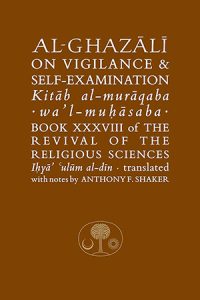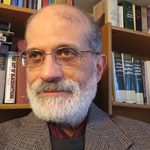Al-Ghazali on Vigilance & Self-Examination (Ihya Ulumuddin Series No. 38)

Author: Imām Al-Ghazali
Translator: Anthony F. Shaker
Publisher: Islamic Texts Society
Year of Publication: 2015
Print Length: 142 pages
Genre: Islamic Studies / Quranic Studies; Theology, Ethics and Philosophy; Science, Reflection & Self-Development; Qur’anic Reflection, Supplication & Prayers; Non-Fiction / Religious Studies
Topic: Allah ﷻ, Prophet Muhammad ﷺ, Islam, Qur’an, Human Nature & Character, Human Psyche, Islamic Psyche, Mindfulness, Ethics & Morality, Spirituality
Al-Ghazali on Vigilance and Self-examination is the thirty-eighth chapter of the Revival of the Religious Sciences and follows on from Al-Ghazali on Intention, Sincerity & Truthfulness. Here Ghazali focuses on the different stations of steadfastness in religion (murabata), vigilance and self-examination being its cornerstones.
As in all his writings, Ghazali bases his arguments on the Qur’an, the example of the Prophet and the sayings of numerous scholars and Sufis.
Table of Contents
Al-Ghazāli’s Introduction to the Revival of the Religious Sciences
Publisher’s Introduction
THE BOOK OF VIGILANCE AND SELF-EXAMINATION
Prologue
1. The First Station of Steadfast Commitment: Agreeing Upon the Conditions
2. The Second Steadfast Commitment: Vigilance
3. The Third Steadfast Commitment: Self-examination After the Act
4. The Fourth Steadfast Commitment: Punishing the Soul for Its Dereliction
5. The Fifth Steadfast Commitment: Renewed Striving
6. The Sixth Steadfast Commitment: Self-reproach and Self-censure
Notes
Appendix: Persons Cited in Text
Bibliography
Index to Qur’ānic Quotations
General Index

Imām Abu Hamid al-Ghazali is a 11th century Muslim scholar. He was one of the most prominent and influential philosophers, theologians, jurists, and mystics of Sunni Islam. Al-Ghazālī was born at Ṭūs (near Mashhad in eastern Iran) and was educated there, then in Jorjān, and finally at Nishapur (Neyshābūr), where his teacher was al-Juwaynī, who earned the title of imām al-ḥaramayn (the imam of the two sacred cities of Mecca and Medina). He was active at a time when Sunni theology had just passed through its consolidation and entered a period of intense challenges from Shiite Ismâ’îlite theology and the Arabic tradition of Aristotelian philosophy (falsafa). Al-Ghazâlî understood the importance of falsafa and developed a complex response that rejected and condemned some of its teachings, while it also allowed him to accept and apply others. His great work, Iḥyāʾ ʿulūm al-dīn or Ihya Ulumuddin (“The Revival of the Religious Sciences”), made Sufism (Islamic mysticism) an acceptable part of orthodox Islam.
Source: https://plato.stanford.edu/entries/al-ghazali/
More from Imam al-Ghazali in this library, click here.

Anthony F. Shaker is a specialist in Islamicate and German philosophy. He has a BA in Sociology with Philosophy from Concordia University, Montreal, and both MA and PhD from Institute of Islamic Studies, McGill University, Montreal. He is the author of several studies including the only complete study of Sadr al-Din Qunawi. He is also the translator of both Al-Ghazali on Intention, Sincerity & Truthfulness and Al-Ghazali on Vigilance and Self-examination in the Islamic Texts Society’s al-Ghazali Series.
Source: https://independent.academia.edu/AnthonyShaker
More from Anthony F. Shaker in this library, click here.
